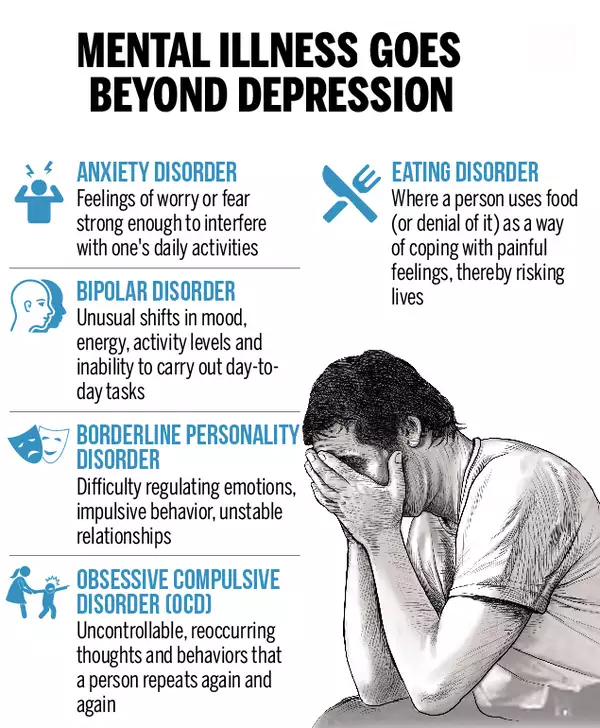The Ministry of Labour and Employment’s year-end review for 2024 highlighted an important deadline: by March 31, 2025, all States and Union Territories are expected to complete the harmonization and pre-publication of draft rules for the new Labour Codes. This presents an opportunity for the government to address the mental health challenges of workers, particularly those in the blue-collar sector, by creating a liability-based framework for their mental well-being. This would be a step towards bridging the gap between the mental health needs of blue-collar workers and the current policy landscape, which is often inadequate in meeting these needs.
Rising Significance of Mental Health
For the first time, the Economic Survey of 2024 acknowledged mental health as a key driver for national development. The National Mental Health Survey (2015-16) revealed that 10.6% of adults in India suffer from mental disorders, with treatment gaps ranging from 70% to 92% depending on the condition. Blue-collar workers, particularly those employed in physically demanding, unsafe, and under-regulated environments, are more vulnerable to mental health issues. The World Health Organization (WHO) identifies several workplace factors that can adversely impact mental health, including:
- Excessive workloads
- Long and unsocial working hours
- Unsafe physical working conditions
- Job insecurity
- Inadequate pay
These factors are particularly damaging for blue-collar workers who, in addition to facing physical dangers, often lack adequate mental health support or preventive care.

Challenges in Existing Legislation
The current Labour Codes and social security frameworks are insufficient in addressing mental health concerns for blue-collar workers, leaving them vulnerable in several key areas.
1. The Occupational Safety, Health, and Working Conditions Code (OSHWC), 2020:
o The OSHWC Code focuses primarily on physical safety and does not address mental well-being. The phrase “as far as reasonably practicable” in Section 6(1)(d) provides a vague mandate to ensure a safe work environment but excludes mental health.
o Furthermore, the term ‘health’ in the OSHWC refers solely to physical health, leaving the mental health of workers unprotected.
2. The Code on Social Security (CSC), 2020:
o Under the CSC, the definition of ‘employment injury’ does not include mental strain or mental health issues arising from work. This excludes workers from being compensated for stress or conditions like anxiety and depression resulting from their work environment.
o Workers must prove a direct link between their mental health issues and the nature of their job, making it difficult for them to claim compensation for mental health-related conditions.
Corporate Efforts and Disparities in Mental Health Support
While there has been progress in addressing mental health in corporate sectors, particularly for white-collar workers, blue-collar workers remain largely underserved.
- Corporate Initiatives: Companies like Infosys, Wipro, and Tata Consultancy Services have implemented programs like HALE (Health Assistance and Lifestyle Enrichment) and Mitra to enhance the well-being and mental health of their employees. These initiatives focus on work-life balance, mental health support, and stress management.
- Government Initiatives: The Tele Manas initiative, launched by the government, provides a helpline for those experiencing mental health distress. However, its voluntary nature and limited outreach to blue-collar workers have hindered its effectiveness. Many blue-collar workers lack awareness about the program, and some are hesitant to reach out due to the stigma surrounding mental health.
This disparity in mental health support creates a gap between the well-being of white-collar and blue-collar workers, even though both groups face significant stress and risk.
Addressing the Mental Health Needs of Blue-Collar Workers
To address the growing mental health challenges among blue-collar workers, several legislative and policy reforms are required.
1. A Rights and Duty-Based Legislative Framework: A comprehensive legislative framework that balances the rights and duties of both employers and employees is crucial. Employers must be mandated to create safe and healthy work environments that protect both the physical and mental well-being of workers. This could include mandatory policies for mental health awareness, stress management, and preventive care.
2. Expanding the Definition of Occupational Diseases: The CSC, 2020 must be amended to include mental health conditions as occupational diseases. This would ensure that workers suffering from mental health issues due to their work environment are eligible for compensation. A clear and holistic list of occupational diseases should be introduced, which includes conditions like job-related stress and work-induced anxiety.
3. A Tripartite Model for Worker Well-Being: The government could promote a tripartite model that brings together employers, mental health professionals, and workers to develop initiatives that focus on early identification of mental health issues and provide continuous support. Mental health professionals should be integrated into workplaces to provide regular assessments and interventions.
4. Regulating Working Hours: The growing trend of excessive working hours, especially in industries that employ blue-collar workers, needs to be addressed. Work-life balance must be prioritized, with the government regulating working hours to ensure that employees are not overburdened with work demands that negatively impact their mental health.
5. Employer Responsibility in Raising Awareness: Employers should be statutorily required to raise awareness about mental health issues and available support systems, such as Tele Manas. By actively promoting mental health literacy and reducing stigma, employers can help workers feel more comfortable seeking help for mental health issues.
Conclusion
As India continues to grow and its workforce becomes more dynamic, the mental health of blue-collar workers must become a central concern. The challenges they face, including long working hours, unsafe environments, and limited access to mental health support, highlight the need for a comprehensive legislative framework. The upcoming Labour Codes provide an opportunity to address these gaps by expanding the definition of occupational diseases, creating a tripartite model for worker well-being, and regulating working hours. By prioritizing mental health alongside physical safety, India can create a more equitable and sustainable work environment that benefits all workers, particularly those in the blue-collar sector.
|
Main Question: “Satyamev Jayate to Shramev Jayate” envisages a vision of worker welfare in India. Discuss the role of mental health in this vision, specifically for blue-collar workers, and how the upcoming Labour Codes can help realize this goal. |







